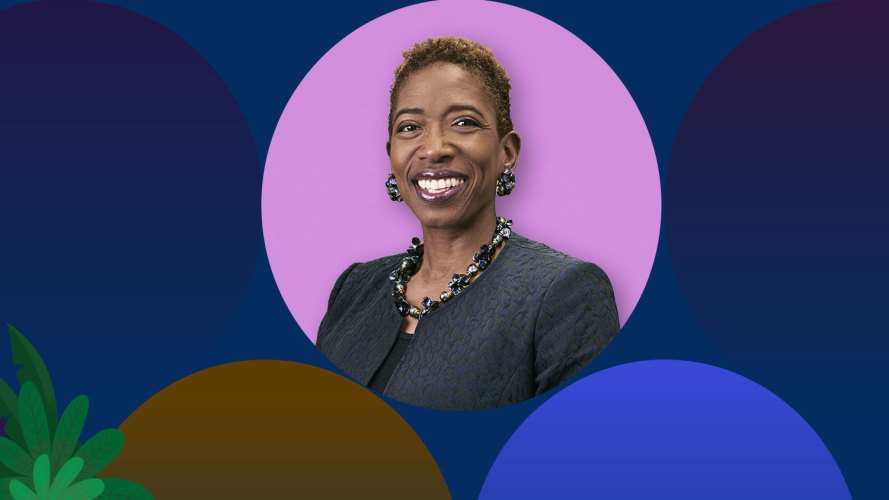Carla Harris: Building Relationship Currency in the Workplace



Carla Harris, vice chairman and managing director at Morgan Stanley, vowed that when people came to her for advice, she would provide them with tools and strategies honed by experience.
Carla Harris knows a thing or two about building a successful career. At its core, Harris said, regardless of what business you’re in, we are all in the “relationship business.” Key decisions about your career are made when you are not in the room and having advocates and sponsors who will advocate on your behalf are essential.
Harris started her successful career more than 30 years ago on Wall Street, as one of the only Black women in the industry at that time. She went from a first-year associate in recruiting at an investment bank, to now vice chairman and managing director at Morgan Stanley.
“Part of my purpose is always about delivering excellence no matter what I’m doing. Whether I’m singing on a stage, speaking or counseling and advising in an investment banking capacity — it’s all about delivering my best.”
Harris spoke at Representation Matters, our fourth annual racial equality summit in July, where she shared some of her best career advice. The summit seeks to elevate and amplify the voices of Black, Latinx, Indigenous, and LGBTQ+ community leaders who are not only making space for others but also changing the spaces they are in for the better.
Harris shared that while climbing the corporate ladder, she made her own personal missteps amidst numerous victories. She vowed that when she reached senior management and people came to her for advice, she would provide them with tools and strategies honed by her own experience. Here are some pearls of wisdom, edited for clarity, she shared:
Why showing off your work is important
Carla Harris: It’s important that you own the great things you deliver in the organization. You should not feel uncomfortable about taking credit for your work. If people don’t know that you did it, then how can they reward you? How can they know that you are a leader? If you’re uncomfortable taking the spotlight, then use the pronoun “we.” You can say, “Look at what we did, I’m so proud of the team, we got this done.” But you must be comfortable owning and taking responsibility for your great work. You certainly will take responsibility for the mistakes that are made so take responsibility for the great things you accomplish as well.
If you’re the “Only one in the room” — leverage your power
CH: One thing I did not do throughout my career is to look at being a woman or a person of color as a liability. So often, I hear people of color and women say, “I’m the only one.” One of the things I’ve learned is if you’re the only one in the room that looks like you, you’re the only one in the room that looks like you. It’s a major asset. You don’t have to fight for attention because everybody’s looking. You don’t have to fight to be heard because everybody’s listening. Whether they act like they’re listening or not, they’re listening. So all you have to do is to deliver your excellence into that expectation. And the lower the expectations are, the more you’re going to blow them away. Use that as your leverage and as your power.
CH: These are things I did not realize and did not know when I first started in my career. I also didn’t understand the power of relationships because if you’re growing up a person of color, especially as I did in the South, people said, “Keep your head down, work really hard. Just work really hard, put those points on the board.” And while putting the points on the board is important, what really allows you to accelerate through an organization is relationships.

Nurturing mentorship and sponsorship relationships
CH: Building relationships is simply a function of the frequency of touch. Just like in your personal life, you build and nurture relationships over time. In the corporate environment, it can be light touches, meaning interactions. For example — you see someone in the elevator all the time and you strike up a conversation, or you stop by someone’s desk and ask what they have planned for the weekend. Those light touches are the things that help you build a relationship in an environment.
Mentors don’t have to be within your organization. The important thing is they know you very well and understand the context that you’re working in, so they can give you tailored advice you can successfully execute.
On the other hand, a sponsor needs to be in your organization. First, they need to have some visibility into your work because they have to have credibility behind closed doors when they speak on your behalf. Second, they need to have a seat at the decision-making table, and third, they need to have the power to get — whatever it is — done.
How to find a sponsor
CH: The best way to find a sponsor is to study your organization for two weeks and observe who has a seat at the decision-making table, who does not have a seat at the table, but has influence with those decision-makers, and who are the toxic people you want nothing to do with. Once you’ve figured out who has a seat at the table and who has visibility into your work, you pick two or three people that you start to build a relationship with hopes a sponsor relationship will naturally form.
If it doesn’t, you might have to exercise your power and go to them and say “Hi (name), I know you’ll be having a conversation about (project, new role, promotion, etc) and you and I have worked together a lot and you’ve had a lot of visibility into the work I’ve done. I really would appreciate you sponsoring me in that conversation, and speaking up on my behalf. Here’s why I think I’d be great at that (project, new role, promotion).” Either they will say, “Yes, I couldn’t agree more,” or they will say “no.” Don’t be afraid because even that response is important for you. Now you can ask for feedback from them as to why they don’t feel comfortable advocating on your behalf. Don’t debate — take the feedback and use it to inform the conversation you have with the next person you ask to sponsor you.
What does it mean to be your authentic self at work?
CH: The first thing is to know who you are. I don’t say that lightly because before we all got stopped by the COVID-19 pandemic, many of us were running around so much we forgot to check in with who we are. Before you go back into the office, ask yourself, “Who are you now?” Because none of us have been untouched by what we have gone through in the last 15 months. Consider, how are you different? How do you think differently?
CH: Secondly, it’s important to understand that we’re all multifaceted, there is not just one you. There’s an intellectual you, a funny, argumentative, frivolous you — so own the fact we’re all multifaceted. Now the third, and this is key, you need to bring all of you together so you can be free to meet people wherever you are, and wherever they are.
When you meet someone, decide in the moment which facet of you will authentically connect. It could be you, the businesswoman that walks into the office, but it could be you, the mother, that connects with a colleague on your team. The mistake I think millennial and Gen Z professionals make is they believe in order to be authentic, they have to have all the facets on display at the same time, and wear it all on their sleeves, but they don’t. You have all of these facets walking into the room with you, but you can decide in the moment which one is going to connect with that person or the 15 people in the meeting.
Pearls of wisdom
Harris shared so many but a key takeaway is that too often in the workplace, we focus intently on the “performance currency” that we fail to invest in the “relationship currency.” As you continue growing in your career, be intentional about how you show up at work and the relationships you’re nurturing. Create space for others to bring their full, authentic selves to work as you do the same.
Commit to equality
At Salesforce, we are committed to driving equality in our workplace as we foster a culture where employees feel valued and empowered to succeed.




























